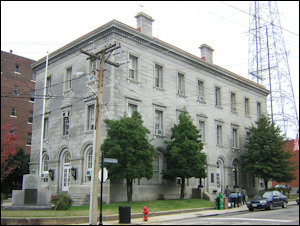The city of Petersburg’s financial woes are so bad that it nearly defaulted on a $4.5 million Revenue Anticipation Note (RAN) due June 30, but was saved at the last minute by a team of auditors dispatched by Secretary of Finance Richard D. “Ric” Brown. “It was questionable up to June 29,” whether the city would be able to pay off the note on time, Brown told the Richmond Times-Dispatch.
The revelation of the near-default occurred deep in the T-D story tracing how Petersburg came close to financial collapse, but the story provides no details on how the default was averted.
The article does provide considerable new detail on how problems have been festering for years. The emergency auditors found that the city needs to close a $12 million budget gap this year even as it addresses $19 million in unpaid bills.
The city has been running structural deficits for years. Auditors with Davenport & Co., which has advised the city on-again, off-again for several years, issued recommendations in 2012 for shoring up the city’s finances but the city took no action. As the city’s finances deteriorated, S&P, the bond-rating agency, downgraded its debt to BBB, a below-investment grade rating.
One way Petersburg papered over the shortfalls was by draining its reserve accounts. “Strongly rated Virginia governments will have an unassigned cash balance in the 15% range, even higher. That’s a good target,” David P. Rose, senior vice president with Davenport, told the T-D.
Bacon’s bottom line: Let Petersburg be a warning to all other cities — and to citizens who take an interest in their local governments. In previous posts, I have alluded to the tricks to which fiscally stressed localities often resort to “balance” the budget: (1) short-changing pension payments, (2) under-investing in maintenance, and (3) slow-paying creditors. We can now add a fourth: (4) depleting cash reserves. I am sure there are others.
The comforting news (comforting to those of us not living in Petersburg) is that S&P was paying close enough attention to the evolving situation to lower its bond rating. Nearly all Virginia localities have investment-grade bond ratings — several have AAA ratings — so there may not be much to fear. Still, we should remember: bond-rating agencies have been caught napping before.
In related news… While Wall Street is urging state and local governments to take advantage of record-low interest rates and issue bonds to repair aging roads, bridges and buildings, most are resisting the siren call of piling on more debt. New government bond issues have dropped to the lowest level in 20 years — about $140 billion last year, about 53% lower (adjusted for inflation) than in 2006. (The pace of borrowing has picked up modestly this year.)
S&P Global ratings analyst John Sugden said told the Wall Street Journal that the reluctance to add debt often “reflects good budget management” by governments whose revenue projections leave no room for additional debt payments or upkeep costs for newly constructed projects.
Here’s the question: Are state and local governments spending enough to maintain their infrastructure, or is the condition of roads, bridges, water & sewer plants, commuter rail lines slowly deteriorating — a hidden form of structural deficit?



